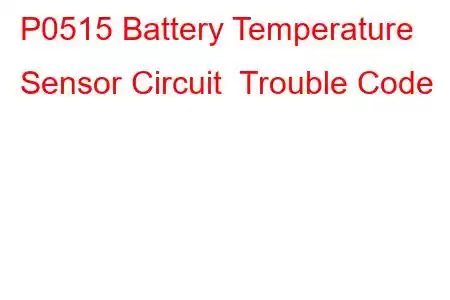P0515 Battery Temperature Sensor Circuit
OBD-II Trouble Code Technical Description
Battery Temperature Sensor Circuit
What does that mean?
This generic powertrain diagnostic trouble code can typically apply to all OBD-II equipped vehicles, but shows up more often in certain Chrysler, Dodge, Jeep, Mitsubishi and Toyota vehicles.
Although generic, the exact repair steps may vary depending on year, make, model and powertrain configuration.
The Battery Temperature Sensor (BTS) is usually located close to the battery /mounted inside the PCM (powertrain control module). The BTS sensor converts the temperature of the air surrounding the battery into an electrical signal for the Powertrain Control Module (PCM).
The PCM receives this voltage signal to determine how much voltage the battery will receive while charging the battery based upon localized temperatures. This code is set if this input does not match normal engine operating conditions stored in the PCM's memory, even for a second, as this diagnostic trouble code demonstrates. It also looks at the voltage signal from the BTS sensor to determine if it is correct at initial Key On.
Code P0515 means that a general malfunction has been detected and could have been set because of mechanical (physical damage to the sensor itself, thereby causing an electrical fault) or electrical (BTS sensor circuit) issues. These cannot be overlooked in the troubleshooting stage, especially when dealing with an intermittent problem.
Troubleshooting steps may vary depending upon manufacturer, type of BTS sensor and wire colors. An example of a battery temperature sensor is shown here:
What is the severity of this DTC?
Severity in these cases will be not severe. Since they are electrical failures, the PCM can compensate adequately for them.
What are some of the symptoms of the code?
Symptoms of a P0515 trouble code may include:
Malfunction Indicator Lamp (MIL) on Possible low indicated charging voltage Charge indicator light onWhat are some of the common causes of the code?
Causes for this P0515 code may include:
Open in the signal circuit to the BTS sensor - possible Short to voltage in the signal circuit to the BTS sensor - possible Short to ground in the signal circuit to the BTS sensor - possible Failed BTS Sensor - likely Failed PCM - unlikelyWhat are some P0515 troubleshooting steps?
A good starting point is always to check for technical service bulletins (TSB) for your vehicle. Your issue may be a known issue with a known fix put out by the manufacturer and can save you time and money during diagnosis.
Next, locate the battery temperature sensor on your vehicle. This sensor is usually located close to the battery /mounted inside the PCM. Once located, visually inspect the connector and wiring. Look for scraping, rubbing, bare wires, burn spots or melted plastic. Pull the connector apart and carefully inspect the terminals (the metal parts) inside the connector. See if they look burned or have a green tint indicating corrosion. Use electrical contact cleaner and a plastic bristle brush if cleaning of the terminals is needed. Let dry and apply electrical grease where the terminals contact.
If you have a scan tool, clear the diagnostic trouble codes from memory, and see if P0515 code returns. If it does not, then the connections were most likely your problem.
If the P0515 code does return, we will need to test the BTS sensor and its associated circuits. With the Key Off, disconnect the electrical connector at the BTS sensor. Connect a Digital Voltmeter black lead to the ground terminal at the BTS sensor wiring harness connector. Connect the red lead of the Digital Voltmeter to the signal terminal at the BTS sensor wiring harness connector. Turn Key On Engine Off. Check manufacturer's specifications; voltmeter should read 5 volts. If not, repair the signal or ground wire, or replace the PCM.
If the prior test passed and you continue to get a P0515, this would most likely indicate a failed BTS sensor, although a failed PCM could not be ruled out until the BTS sensor had been replaced. If unsure, seek assistance from a trained automotive diagnostician. PCMs must be programmed, or calibrated to the vehicle to be installed correctly.
Read: 55


